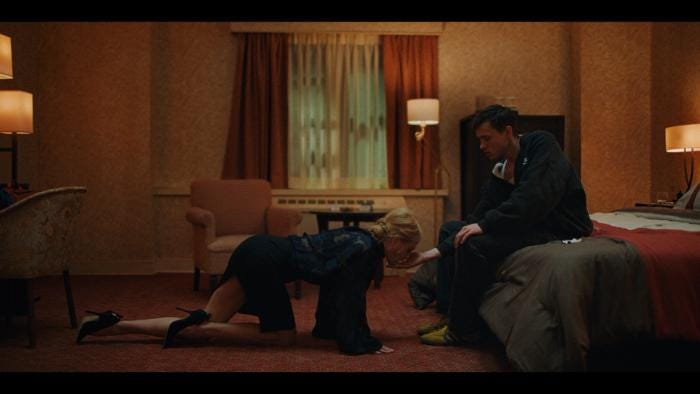In the first act of Babygirl, new interns at a lucrative robotics company watch a standard corporate sexual harassment training video. After instructing the new employees to immediately report any violations of conduct, the voice from the screen states: “A respectful workplace is an efficient workplace.”
At the helm of the company is CEO Romy Mathis (Nicole Kidman), a Lean-In Girlboss-type, somewhere in her 50s. Romy seems to “have it all” — a high-powered career, a hot and doting theater director husband (Antonio Banderas), two kids, two houses, and the time and money for anti-aging upkeep and general ‘self-care’ (botox, cryo sessions, oxygen tanks, EMDR). The interns include the bold and brash Samuel1 (Harris Dickinson), who first meets Romy outside the office, intervening before an off-leash dog attacks. The agitated dog responds to him, is pacified in his arms. “How’d you get that dog to calm down?” Romy asks him later in the office. He gave it a cookie, he tells her; “Why, do you want one?” In that same scene he scolds her for drinking too much coffee. (Some of us were squirming in our seats.) Their tension-building isn’t long, but it’s potent, and soon official boundaries are crossed. First, technically, with a kiss, but then, more officially with a tall glass of milk. (Some of us, at this point, were making audible noises.)
The backdrop of the sterile, corporate workplace juxtaposed to a feral-curious sexual relationship offers a thick metaphor, and one director Halina Reijn emphasizes with her cinematographer, Jasper Wolf: the camera work is a mix of drone footage (robots) and handheld (human flesh). Reijn’s vision is gorgeous, the colors rich, the lighting moody yellow in hotels, stark white at the office and Romy’s city home. I didn’t mind the heavy-handedness —Reijn said herself she set out to create “a fairytale,” a fable as “warning” of what happens when “a woman suppresses the beast inside of her.” The blunt symbolism works well, even when the figure of a dog becomes stand-in for what Romy wants (to be dominated by), and who Romy is (at her core).
Samuel will not be reporting any violation of conduct. Instead he will invite Romy to a cheap hotel room where they will engage in an awkward attempt at a Dominant/submissive scene. There is brief laughter and hesitation, moments of regret and embarrassment. Samuel is not Christian Grey, he has no dungeon or fan-fic-created Dom skills; he is exploring this realm of sexuality at least partially how Romy is: with desire and curiosity. There are incredibly hot moments throughout the fits and starts: he stands her face-first in the corner of the room; he makes her eat candy from his palm, then he makes her spit it out. Some will recognize a deep blip of sub-space here— Romy whimpers, pathetically, when he asks her to give the candy back. She obeys, but she whimpers, then strokes her face against his knee and inner thigh like an animal. That moment, to me, was even hotter than the eventual orgasm he’ll bring her to, fingering her from behind.
In general, throughout the film, Kidman’s face scrunches and twists in delicious insecurity.2 Subs endure this terrifying exposure for what comes after. In one scene, Samuel sits across from her in a chair and tells her to undress. She is childlike and scared, insisting her body is not good enough. It is here where Samuel gets to hold her and deliver the titular line. “You’re my babygirl,” he says stroking her hair. (Some of us, at this point, were melting.)
So their dynamic is established, and a dreamy needle drop of INXS’s “Never Tear Us Apart” provides the soundtrack for their early sex montage: we see a lot of kissing, a little bit of implied p-in-v penetration from behind, some fingers-in-mouth, pushing against walls, firm neck-grabs, and an absolutely glorious intentional breaking of a ceramic object that Romy cleans up on her knees, kissing Samuel’s shoes for good measure. There is a second montage, to an even more perfect needle drop, and it is just as steamy: Samuel dances; Romy drinks milk on all fours from a saucer; there are more fingers in her mouth; and there is more aftercare (which we see most prominently in the first hotel room, but then again when Romy holds a more emotionally-exposed Samuel. Hashtag, Doms need aftercare too).
When I read critics say that this movie is not sexy, it is clear to me that they likely lean more vanilla on the sexuality spectrum.3 This is fine, but it means this movie is not going to land as much for them as it will for others. Naomi Frye, for The New Yorker, suggests that Romy’s desire for D/s is just a mirror of her desire for robotic control in the workplace. Certainly those drawn to D/s often like the possibility of rules and constraints (literal and figurative), but subspace, ultimately, is an abandonment of all of it. It is feral babble, and whimpers, and rubbing noses against kneecaps. Romy and Samuel don’t even talk about rules until halfway through the film. Given the major stigma around kink, ‘the community’ will often market BDSM as some totally safe space, as if we all have spreadsheets with contracts and safewords at the ready. But that’s not true for everyone (especially not for new folks). More than formal consent, as I’ve argued elsewhere, what D/s dynamics require is trust. There is no guarantee—anywhere in life—that nothing will go wrong, but in a dynamic, ideally you can trust your partner to pivot and adjust. For better or worse, repair is far more realistic than safety. This also leaves room for the possibility of risk—doing something that wasn’t previously formally agreed upon; and this can be extremely rewarding.4
In a memorable scene at the office, Samuel makes a similar argument. After Romy tries to end their affair, Samuel is a bit petulant. He’s young and annoyed and doesn’t take it well. He also believes that Romy still wants him — he’s right, they both know how good he is at reading people. (A smart former-service industry friend noted that this is probably aided by his part–time job as a bartender; another reviewer astutely noted that this skill is often common among survivors.) So he pushes her on it, threatening to ask for a transfer that Romy is convinced would lead to an investigation. As she gets more upset, though, he softens. He makes clear that he has no intention of getting her in trouble. He just thinks they should be able to continue something that feels so good; it has nothing to do with her job or her marriage, he insists. “As long as it’s consensual,” he declares. “What does that mean?” Romy asks exasperated. “Well it’s about giving and taking power, no?” Samuel responds. Romy is frustrated, asks if he looked that up at a library. They go back and forth a bit, and Samuel rephrases: “It’s about trust! Both parties have to agree.” An educated xillenial is doing an Instagram slideshow for the corporate Gen Xer.
It’s a fascinating moment, especially because, in a matter of just a few minutes, the power keeps shifting between the two of them. Romy always has the power to fire him, but Samuel can also choose to wield his subordinate position to threaten her job too. A too easy understanding of power is that it’s static: the boss is always the one with the power; the man is; the straight person is. This would be so nice! Things would be so easy. And certainly there are plenty of #MeToo examples that are exactly this cut and dry: a mega-wealthy, cis white male director raping actresses; a cis white male doctor abusing gymnasts; a cis white male future-president grabbing pussies. Sometimes it is that simple. But we cannot build a politics, feminist or otherwise, on the black and white examples. We live in a world of too much gray, and it’s a disservice to everyone if movements to end harm insist on blueprints. What happens to everyone else? What happens to the less clear-cut examples of harm, what happens when intersectionality complicates the standard power analysis, and what happens to the experiences of pleasure that the blueprints demand to be reclassified as harm?
I think frequently of the late, great queer femme writer-activist, Amber Hollibaugh. Long before #MeToo, Amber had a lot to say about sex and work: “No political movement can avoid the reality of desire in its midst. Every office building is filled with the illicit affairs, the unwanted pregnancies, the crises that happen in human lives,” she says in an interview. “For a political movement to not understand that sexuality is a profound component of both how people are oppressed and how people dream, is to not recognize the reality of political power and where it’s centered.”
What Amber helps us do is break away from insufficient liberal #MeToo workplace politics. Instead of asking, “How can we keep hierarchical workplaces safe? How can we keep sex out of the office?”, we get to ask, “Can we dream of something beyond hierarchies? Can we spend more time in the realm of the erotic, and less in the realm of labor?” Theorist of antiwork politics Kathi Weeks writes, “When we have…little imagination of an alternative to a life centered on work, there are few incentives to reflect on why we work as we do and what we might wish to do instead.” Romy is work-addicted, but not so much that she doesn’t succumb to the absolute world-toppling that is D/s new relationship energy. In portraying this, Reijn offers something unique to the post-MeToo feminist film canon.
To be clear, Babygirl is not touting an antiwork philosophy per se; by the end, Romy’s company and her position in it are secure. She is lightly threatened by her assistant Esme (Sophie Wild5), but the goal of everyone involved is to maintain the status quo and/or get a promotion. But the training video at the start is right: as soon as Romy disrespects the rules of corporate America, her efficiency drops. In a bout of guilt, she visits her husband in the middle of the workday, for only the second time in their 19-year marriage. “Don’t you have to be at work?” Jacob (Banderas) asks her, then recalls the last time she dropped in was when she was afraid he was having an affair with a light tech. Love and sex get in the way of productivity.
The ethics of Samuel and Romy’s sex/romance are murky, of course. Being cheated on is brutal, and Banderas’s Jacob gives a heartbreaking wounded monologue that elucidates the painful impact of Romy’s choices. And workplace sex, especially between boss/interns is generally a *really bad idea*! But in the case of Samuel and Romy? I don’t believe there was any coercion beyond their pulsing attraction. And I love that Reijn intentionally spared her leads from major punishment—there were consequences, sure (Jacob’s broken heart; Samuel’s relocation; losing Esme’s respect), but unlike the erotic thrillers of the 90s, or the old plays where women get to have a little taste of self-actualization6, no one dies.
In interviews, Reijn acknowledges that this project is personal. She echoes some of what we hear Romy say in the scene where she comes clean with Jacob: “I want to be normal, I want to be what you like.” Despite having experienced incredible pleasure through kink, Romy is desperate to rid herself of the impulse toward it.7 Reijn says, accurately, that a lot of women suffer from this pull toward contradictory desires. I think I felt so connected to this film — and connected to Reijn, living her best life as an artist, but admitting she wonders if she should have had kids — because I have been there. Am still there. I love writing about sex, making jokes about aging into (cat)MILF-hood, having time to write and travel. But then sometimes I jolt up at 3am embarrassed of myself; sometimes I receive Christmas cards of friends’ family portraits and I cry. I have nothing in common with a rich corporate lady CEO except for the human condition.
Romy and Samuel’s last dalliance occurs in a beautiful scene at a rave, with lighting that mimics the EMDR therapy we see Romy endure throughout the film.8 Samuel has invited her there. It is very queer (an unknown femme kisses Romy on the dance floor, Samuel presses foreheads with another man). It is very free. I was reminded of McKenzie Wark’s writing on raves: “[Raves] happen in temporary spaces, in disused warehouses or offices—brought alive just for the occasion. They are special situations to which ravers bring our collective will and desire.”
I think, if I had to summarize the most powerful takeaway from Babygirl it would be akin to this. I think I might call it something about the power of “rupture.” Romy and Samuel’s affair ruptured her shame, and her workdays; Romy’s desire for stability ruptured her relationship with Samuel; Halina Reijn’s desires for kink (presumably) ruptured her at some point, and so too do her desires for normalcy rupture her life as an artist. Kink, as anyone who’s practiced it knows, is a perfect vehicle to illustrate the way we, throughout our silly little existences, encounter moments where we are “brought alive for the occasion.” Not for productivity, but for our will and our desire. Ruptures on our paths, in the service of nothing other than making better sense of ourselves, through and with each other.
Good girl, Samuel tells Romy for finishing her milk at the bar. A totally discordant and useless job well done. How confusing! How illuminating! How fucking satisfying.
Samuel is coded as sort of working-class. His suit is ill-fitting! He wears a chain! His mother was a teacher, his father a former fighter-turned-private security guard. I name this because his boldness is not prep-school weekend-yacht male entitlement as much as working-class masculinity —also entitled, but—especially for Samuel who seems to be thoughtful about things like consent—also more complex.
Admittedly I am glad that this film defies the annoying idea that botox ruins the ability to emote, or the Jordan Peterson-esque argument that our sexual attraction will be limited if men can’t see more lines on women’s foreheads. (These are both things that people have written about recently. I will not link them because I like other things they write sometimes. But these are bad takes!)
There is a line that I haven’t seen mentioned in any reviews—probably because it ultimately didn’t work— but one that I could tell Reijn was offering as a wink to subs who like impact play. After Romy gets botox, she’s left with a bruise near her temple. In the elevator, Samuel sees it behind her hair and says it “looks good on her.” This absolutely has to be a nod to those who like admiring bruises after being spanked or paddled on buttocks or thighs. Unfortunately, a face bruise is a bit off the mark, but I have to say I appreciated the effort!
I highly recommend reading Avgi Saketepoulou’s writing on risk, consent, trauma, and pleasure. She’s doing brilliant and important theorizing.
The race politics of this movie deserve some interrogation. The two leads are white. Esme, the assistant and side-love-interest for Samuel is Black. Black critics have dubbed this common pattern in movies the “Black throwaway girlfriend,” and though Esme has a pivotal role in the plot, she is, for sure, under-written. Wild does a great job with what she’s given though.
One such play is Hedda Gabler, which is the play Jacob is directing during Romy’s affair. In more thick-but-excellent symbolism, Reijn includes his perspective on it. “People think Hedda Gabler is about desire, but it’s not. It’s about suicide.” Jacob thinks a woman’s irrational desires are a death-drive; many women, though, realize ignoring those desires can be death. Kidman said as much about why she took this role: “It would have been a very, very destructive thing to myself to not do it.”
There is much to be unpacked with Romy’s initial self-diagnosis of her kink proclivities as a result of childhood trauma, then her later decision that it’s something she was just “born with.” Both trauma narratives and “born this way” narratives are sort of politically problematic, but also sometimes they are true!
Thank you to P for pointing this out. :)








This is triumphantly good writing and I also now have to see the film
Godddddd I haven’t seen it yet but your movie writing is always so propulsive and fabulous!!! You’ve made me wanna see it and I was on the fence till streaming lol